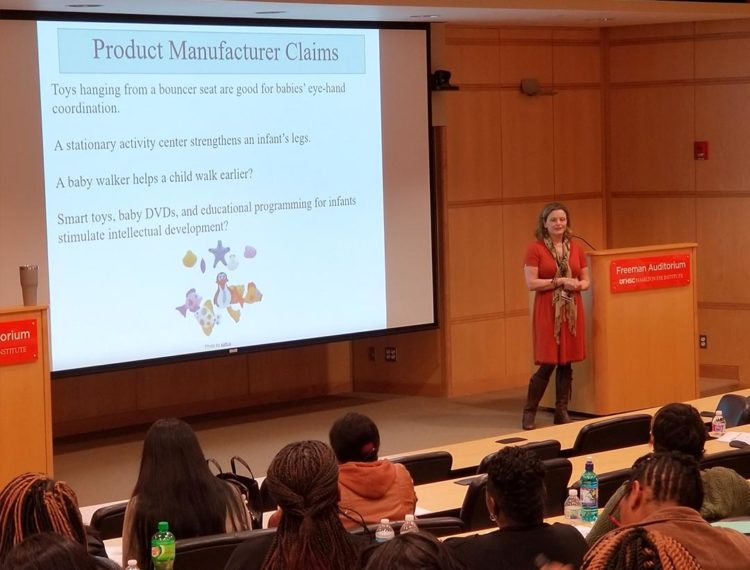 UTHSC invention aims to help babies enjoy ‘tummy time,’ a critical part of healthy development.
UTHSC invention aims to help babies enjoy ‘tummy time,’ a critical part of healthy development.
In the early 1990s, the American Academy of Pediatrics (AAP) recommended that all babies sleep on their backs to reduce the risk of Sudden Infant Death Syndrome, or SIDS.
As a result, the National Institute of Child Health and Human Development launched the Safe to Sleep campaign in 1994 to educate parents and guardians about safe sleep practices. Since this time, SIDS-related deaths have declined by over 50 percent, yet now many babies are experiencing less “tummy time,” which is an important part of healthy development.
One University of Tennessee researcher explores how a lack of tummy time in infancy can impact fine motor, social and emotional skill development later in childhood. She created an innovative new system to help children gain these essential skills and enjoy tummy time in the process.

Dr. Anne Zachry is an associate professor and chair of the Department of Occupational Therapy at the University of Tennessee Health Science Center (UTHSC) in Memphis. Before joining UTHSC in 2013, Zachry practiced as a pediatric occupational therapist for over 20 years, including in the public school system. Her research has primarily focused on tummy time and its impact on development, leading to the creation of the Tummy Time Trainer system for infants.
Unlike other similar products on the market, Zachry’s trainer does not use prop pillows, which put unnecessary, uncomfortable pressure on babies’ armpits. Her system involves two removable, form-fitting foam wedges positioned at a slight incline and a play wedge outfitted with developmentally stimulating multi-sensory toys and baby-safe mirrors.
It shifts the babies’ weight back toward their hips so that they are able to hold their head up better,” Zachry said. “I’m excited about the Tummy Time Trainer. It helped my nieces and nephews and children in the clinic, but I hope when it gets on the market that it will help other babies better tolerate tummy time.”
 Zachry started studying tummy time during the late 1990s when she was working as an occupational therapist in the school system. While in this role, she noticed four and five-year-old children had fine motor problems, poor posture and weakness in their upper extremities.
Zachry started studying tummy time during the late 1990s when she was working as an occupational therapist in the school system. While in this role, she noticed four and five-year-old children had fine motor problems, poor posture and weakness in their upper extremities.
I sent home an informal survey and the common denominator was that the babies did not like tummy time and had spent a minimal amount of time on their stomachs,” she explained.
In 2021, UTRF awarded Zachry a Maturation Grant to help develop and test the Tummy Time Trainer. As a primarily one-woman operation, Zachry has used the funds to purchase supplies to make 25 Tummy Time Trainers for her pilot study, provide incentives for her study’s parent participants, and bring on a work-study student to help with the research. She jokingly referred to her home as an “assembly line” where she makes each of the products herself.
If I hadn’t been with UT, I don’t know that I would have even pursued moving forward with this product,” Zachry said. “UTRF has been great. This is a little different than most of the technology they bring forward, but they have encouraged me and walked me through everything I need to know about the commercialization process.”
 Zachry is currently making modifications to her original Tummy Time Trainer based on feedback from her study’s parents. Additionally, the entrepreneurship-based 2021 Memphis Scipreneur Challenge competition included her technology, with participants creating a business plan and pitching her product in the final pitch competition.
Zachry is currently making modifications to her original Tummy Time Trainer based on feedback from her study’s parents. Additionally, the entrepreneurship-based 2021 Memphis Scipreneur Challenge competition included her technology, with participants creating a business plan and pitching her product in the final pitch competition.
Dr. Zachry has drawn on the strengths of her profession and her own personal experience to meet a need in the marketplace,” said Dr. Lakita Cavin, UTRF senior staff attorney at the UTHSC office. “Her invention has the potential to address a serious issue in the development of young children, and we look forward to working with her to commercialize the technology.”